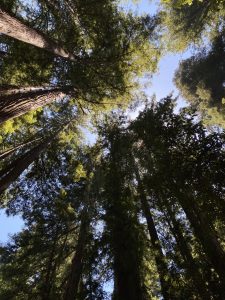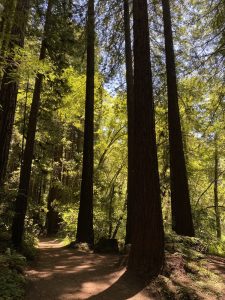We are all aware that working to save the Earth will in turn save us, but this sort of thinking is detrimental to the progress being made toward the climate crisis.
A few months ago, my family and I took a small trip to Henry Cowell Redwoods State Park in Santa Cruz. The whole ride there, my mind was filled with the stress of trying to figure out my post-grad plans as a philosophy student going into my fourth year. I was preoccupied with the existential dread we all experience when contemplating the future.
But when we made it into the park and I truly absorbed my surroundings, all of my worries instantly disappeared. The sheer size of the trees around me, the rays of sunlight beaming through the leaves — it all prompted me to ask myself, how can I feel worried or stressed at this moment when I am here?
View of the treetops at Henry Cowell Redwoods State Park. Photo by Naomi Lopez
Photo by Naomi Lopez
Instances like these ground me in my deep appreciation for nature. The perspective it provides and the reflection it invokes in me by simply existing in all its natural beauty fosters a sort of tranquility that words cannot describe.
One concept in Immanuel Kant’s moral philosophy is worth noting here: the difference between treating something as a means to an end versus as an end in itself. During that moment in the redwoods, I was viewing nature as an end in itself — something that should be valued for its own sake, for the intrinsic worth it holds. The inherent features of nature — reflection, perspective, beauty, relaxation, peace — make the environment worth saving because they cease to exist as soon as the environment does.
Unfortunately, we’ve come to view nature as merely a means to an end. We’ve become conditioned to look at the environment as a stepping stone to achieve some further goal. For instance, the owner of a big corporation might look at a photo of a dense, vibrant forest like the redwoods and automatically consider the profits that can be made from it.
This way of thinking causes us to perceive the environment as something with the sole function of benefiting us. It wrongly instills a mindset of, what service can the environment provide me? This perspective has been taken to the extreme and has serious implications for our environment. Nigeria, for example, “has one of the highest rates of deforestation in the world,” according to the American nonprofit Conservation International.
There are critical reasons why we should focus on the benefits of limiting the effects of climate change, precisely because of how it affects us. Mitigation, according to the Intergovernmental Panel on Climate Change, involves reducing or preventing the emission of greenhouse gases in order to limit the magnitude of future warming. Reduced deforestation is one of the required elements of this mitigation because forests play essential roles in accumulating and storing carbon. So when human activity destroys forest land the size of a football field every six seconds, we have good reason to be concerned about how the effects of deforestation will consequently impact us.
That being said, if we learn to change the way we look at the environment, we can approach the climate crisis from a new lens. After realizing the inherent value of nature, I now have an extra reason to act on the climate crisis. I am motivated to save the earth for its sake, not mine. If we all adopt this mentality of appreciating and valuing the environment as an end in itself, we will be further incentivized towards positive climate action.
There are several individual actions we can take to help shift our thinking about the environment. We might, for example, purchase more plants for our homes or start a small garden — and if you lack a green thumb like me, you can purchase low-maintenance plants like succulents. By taking care of plants on this smaller scale, we are implementing the broader idea of taking care of the environment as a whole. We can also try to take more walks or hikes in nature which allow us to simply appreciate the beauty around us. And for those of us who aren’t able to get outdoors often, just being mindful of the seemingly ordinary, day-to-day encounters we have with nature will help. For example, regarding deforestation, we might be more compelled to do what we can to help reduce deforestation given our circumstances because of this new outlook.
Photo by Naomi Lopez
With this shifted perspective, we may very well come to view successes in climate action as victories for the Earth itself instead of just benefits for us.




